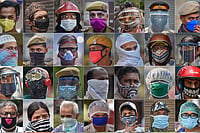REVERED by the most demanding of critics, appreciated by the most ordinary of readers and listeners of poetry and loved by the youngest of budding poets, Nagarjuna was fondly called "Baba" by innumerable admirers across the country. He had the rare quality of striking an emotional chord not only with practitioners of the fine art of poetry but also with any human being who came across him. It was this empathy with people and their social situation which characterised Nagarjuna's personality both as a poet as well as a citizen.
Born Vaidyanath Mishra in Bihar's Mithila region in 1911, he was destined to become a compulsive traveller, giving himself the appropriate nickname 'Yatri'. He started his poetic journey in Sanskrit, but soon started composing in his mother-tongue, Maithili, using Yatri as his nom-de-plume. He was given the Sahitya Akademi award for his Maithili collection in 1965. And though he published his first Hindi poem in 1935, a collection could appear only much later, in 1953.
Nagarjuna traversed a varied terrain both literally and metaphorically. From Sindh to Sri Lanka, from Telangana to Tibet. At the level of ideas, he covered the distance from Buddhism to Marxism, from participating in the Bihar movement led by JP to its sharp poetic critique. He adopted the name "Nagarjuna" while living as a Buddhist monk in Sri Lanka.
He is rightly considered the master of political poetry; in fact, he constantly transformed the vagaries of contemporary history into excellent poetic material. A very sharp eye for detail coupled with unsurpassable wit resulted in him being pronounced a modern-day Kabir. Ironically, this emphasis on the 'political' has made many equally significant aspects of Nagarjuna's poetry appear less important. While he was unabashedly political both as an individual and as a poet, he resisted the temptation of being politically correct in the eyes of his peer group. When the CPI was actively opposing the JP movement, Nagarjuna lent his poetic and physical support to the same. He composed some of his finest poetry during this period and was jailed during the Emergency. His jail experience led to disillusionment with the much-hyped idealism and character of the JP movement—resulting in poetic introspection and, of course, a lot of flak from his new "admirers". Similarly he had the guts and integrity to condemn the presence of the Soviet army in Afghanistan. This 'politically incorrect' act of poetic courage resulted in a vicious campaign launched by a group of insignificant writers who styled themselves as the custodians of "progressive writing".
Contemporary to the core, Nagarjuna was equally immersed in tradition. He interacted with the classical poetic tradition in a refreshingly innovative manner. One of his best known poems is a friendly query to Kalidas asking him whether he is present himself in the conscience of his anguished characters! In yet another poem, the beauty of rising sun causes the poet to question his own atheism through the invocation of the Gayatri Mantra. It is only natural that he transcreated Meghdoot—the excellent poem of longing by Kalidas.
What endeared Nagarjuna to the multitudes of his audience was his evergreen and creative youthfulness and an elemental rootedness. Devoid of any formal training in the English language and literature, he epitomised a very Indian, very desi modernity. His constant and close interaction with the youth was an expression of the inherent creative impulse that also found expression in incessant innovations and ever-present inquisitiveness.
His active interest in politics notwithstanding, Nagarjuna was insistent on his field-poetry. He titled his last collection, Apne Khet Mein (in one's own field). He essentially belonged here. He passed away in his native village—shunning the metropolis of Delhi.

























